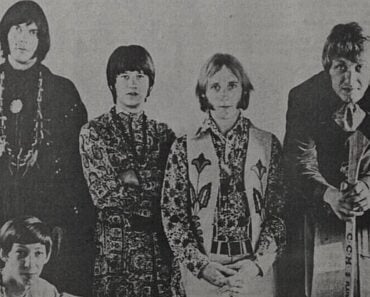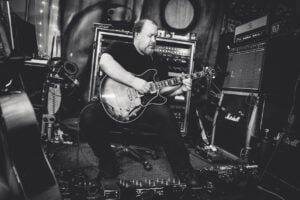
Feature Photo: TDC Photography / Shutterstock.com
From Chicago clubs to Detroit’s rock scene, The Amboy Dukes carved their path through the psychedelic era with thunderous guitars and a revolving cast of talented musicians. The band was formed in 1964 in Chicago, Illinois, by Ted Nugent and later relocated to Detroit, Michigan, where they achieved their greatest success. The Amboy Dukes released six studio albums between 1967 and 1974, with their only major hit single “Journey to the Center of the Mind” reaching number 16 on the Billboard Hot 100 in 1968. Their debut album “The Amboy Dukes” reached number 183 on Billboard’s album charts, while “Baby Please Don’t Go” charted nationally at number 106. The band officially disbanded in 1975, though they were inducted into the Michigan Rock and Roll Legends Hall of Fame in 2008 and reunited for a performance in 2009, receiving a Distinguished Achievement Award.
The band experienced constant lineup changes throughout their existence, with Ted Nugent remaining as the sole consistent member across all iterations. The group went through numerous personnel shifts, transforming from a Chicago-based psychedelic rock act into Detroit’s premier proto-metal band. Their music evolved from garage rock covers to original psychedelic compositions, ultimately serving as the launching pad for Ted Nugent’s successful solo career.
The band transitioned to being Nugent’s backing band before he discontinued the name in 1975. Throughout their active years, The Amboy Dukes recorded for multiple labels including Mainstream Records, Polydor Records, and DiscReet Records. Despite their limited commercial success beyond their signature hit, the band’s influence on the development of hard rock and heavy metal was significant, particularly in the Detroit music scene.
Ted Nugent
Ted Nugent, born in Detroit on December 13, 1948, served as the nucleus and only constant member of The Amboy Dukes throughout their entire existence from 1964 to 1975. He started performing at age 10 and played in groups called the Royal High Boys from 1960 to 1962, and later in The Lourds, where he first met future Amboy Dukes vocalist John Drake. When his family moved to Chicago in 1964, Nugent founded The Amboy Dukes, naming the band after a defunct Detroit R&B group whose name he thought was cool. Upon graduating high school in 1967, he moved the band back to Detroit where they signed with Mainstream Records.
Nugent appeared on every Amboy Dukes album, serving as lead guitarist, primary songwriter, and increasingly as the band’s vocalist. His guitar work defined the band’s sound, from the scorching cover of “Baby Please Don’t Go” to the psychedelic masterpiece “Journey to the Center of the Mind,” which he co-wrote with Steve Farmer. Nugent composed the music while Farmer wrote the lyrics, creating an unusual partnership since Nugent never used drugs while Farmer was heavily involved in the drug scene. As personnel changes mounted, Nugent took on multiple roles including road manager, booking agent, equipment maintenance, and financial management for the band.
Following The Amboy Dukes’ dissolution in 1975, Nugent went on to have a successful solo career in the 1970s and joined the Damn Yankees supergroup in the late 1980s. Since the 2000s, he has continued his rock career while becoming a prominent activist for hunting rights and conservative political causes. His influence extends far beyond music, making him one of rock’s most recognizable and controversial figures.
John Drake
John Drake served as the primary lead vocalist for The Amboy Dukes from 1967 to 1968, having previously been Nugent’s bandmate in The Lourds where they first met. Drake had just been discharged from the army when Nugent called him to Chicago to handle vocals for the newly formed Amboy Dukes. When the band moved to Detroit in 1967, Drake remained as the lead vocalist and became an integral part of their breakthrough period.
Drake’s powerful vocals were featured on The Amboy Dukes’ debut album, including their signature cover of “Baby Please Don’t Go” and other tracks that established the band’s reputation in Detroit’s rock scene. His vocal performance on “Baby Please Don’t Go” featured driving rhythms and powerful delivery that helped raise the bar for Motor City Rock and Roll. Drake’s contributions were crucial during the band’s most successful period, though he was replaced by Rusty Day in 1969 as the band’s sound evolved.
Drake participated in The Amboy Dukes’ 2009 reunion performance at the Detroit Music Awards, where the original lineup performed “Baby Please Don’t Go,” “Journey to the Center of the Mind,” and Mitch Ryder’s “Jenny Take A Ride”. John Drake died on August 29, 2021, at the age of 74, marking the end of an era for the original Amboy Dukes lineup.
Steve Farmer
Steve Farmer joined The Amboy Dukes as rhythm guitarist and lyricist when the band relocated to Detroit in 1967, remaining with the group until 1970. His partnership with Ted Nugent proved crucial to the band’s creative output, as Farmer wrote the lyrics while Nugent composed the music for their most important songs. This collaboration was notable because Farmer was heavily involved in drug culture while Nugent remained completely drug-free, creating an unusual creative dynamic.
Farmer’s most significant contribution was co-writing “Journey to the Center of the Mind,” the band’s only major hit single. AllMusic noted that Steve Farmer “penned the drug-fixated lyrics, adding a psychedelic sensibility to an otherwise proto-metal sound”. His lyrical contributions helped define the band’s psychedelic era and were featured on both “The Amboy Dukes” debut album and “Journey to the Center of the Mind.” Farmer appeared on three studio albums with the band: “The Amboy Dukes” (1967), “Journey to the Center of the Mind” (1968), and “Migration” (1969).
Nugent fired both Farmer and Rusty Day from the band before the end of 1969 because he felt their drug use issues were hurting The Amboy Dukes. After leaving the band, Farmer continued his musical career and in 2000 released “Journey to the Darkside of the Mind” with original keyboardist Rick Lober, representing a rebirth of The Amboy Dukes without Ted Nugent. Steve Farmer passed away on April 7, 2020, at the age of 71, at his home in Redford, Michigan.
Dave Palmer
Dave Palmer joined The Amboy Dukes as drummer when the band relocated to Detroit in 1967, serving as the backbone of their rhythm section during their most successful period. Palmer was part of the classic lineup that recorded the band’s first three albums and achieved their greatest commercial success. His drumming provided the powerful foundation for the band’s signature songs, including “Baby Please Don’t Go” and “Journey to the Center of the Mind.”
Palmer appeared on four Amboy Dukes releases: “The Amboy Dukes” (1967), “Journey to the Center of the Mind” (1968), “Migration” (1969), and “Marriage on the Rocks/Rock Bottom” (1970). His drumming style was integral to the band’s evolution from garage rock covers to original psychedelic compositions. Palmer’s rhythm work helped define the Motor City sound that The Amboy Dukes pioneered.
Palmer left the group in 1971 to accept an engineering job at Electric Lady Studios, marking the end of the classic Amboy Dukes lineup. His departure coincided with major personnel changes that saw Nugent become the sole original member. Palmer’s post-Amboy Dukes career in audio engineering represented a transition from performing to behind-the-scenes work in the music industry.
Rick Lober
Rick Lober served as keyboardist for The Amboy Dukes from 1967 to 1968, playing on the band’s debut album before being replaced by Andy Solomon. Lober is a classically trained composer best known in the Detroit metro area for his frenetic style of keyboard playing. His classical background brought a unique dimension to the band’s early sound, contributing to the sophisticated arrangements on their debut release.
Lober’s keyboard work was featured prominently on “The Amboy Dukes” album, providing textural elements that complemented Nugent’s guitar work and the band’s rhythm section. His contributions helped establish the band’s early identity before their sound evolved in a more psychedelic direction with his replacement Andy Solomon. Although his tenure with the band was brief, his musical foundation helped shape their initial recordings.
Since the early 1990s, Lober has been in and out of the studio, appearing as performer/songwriter on Steve Farmer’s CD “Journey to the Darkside of the Mind” completed in 2000. He has been working in the studio and performing live with Detroit rock legend Jeffrey Faust and his band The Woodsman, which performs throughout Michigan and Canada. Lober participated in the 2009 Amboy Dukes reunion performance at the Detroit Music Awards.
Bill White
Bill White served as bassist for The Amboy Dukes during two separate periods: initially from 1967 to 1968 on their debut album, and again briefly in 1972 during their period without a record contract. White was part of the original Detroit lineup that signed with Mainstream Records and recorded “The Amboy Dukes” album. His bass work provided the foundation for the band’s early garage rock sound and their breakthrough cover of “Baby Please Don’t Go.”
During his first stint with the band, White contributed to the rhythm section that helped establish The Amboy Dukes as one of Detroit’s premier rock acts. His playing was featured throughout the debut album, supporting both the band’s covers and original material. White was replaced by Greg Arama before the recording of “Journey to the Center of the Mind” in 1968.
White returned to the band in early summer 1972 when The Amboy Dukes had no record contract, playing alongside Ted Nugent, Dave Gilbert on lead vocals, and Keith Johnstone on drums. This reunion was short-lived as the band underwent another lineup change by late summer 1972. White participated in the 2009 reunion performance at the Detroit Music Awards, representing the original lineup that launched the band’s career.
Andy Solomon
Andy Solomon replaced Rick Lober as keyboardist in 1968 and became one of the longest-tenured members of The Amboy Dukes, serving until 1971. Solomon played organ, piano, saxophone, and provided vocals, expanding his role beyond just keyboards. His multi-instrumental abilities and vocal contributions made him an integral part of the band during their psychedelic peak and subsequent evolution.
Solomon appeared on four Amboy Dukes releases: “Journey to the Center of the Mind” (1968), “Migration” (1969), “Marriage on the Rocks/Rock Bottom” (1970), and “Survival of the Fittest Live” (1971). His exceptional vocal performance was showcased on “Migration” with an incredible cover of Frankie Lymon and The Teenagers’ “I’m Not A Juvenile Delinquent”. Solomon’s saxophone work added jazz elements to the band’s sound, contributing to their musical sophistication during this period.
Solomon was fired by Nugent along with Rusty Day due to ongoing issues within the band. Despite his departure, Solomon briefly returned in 1971 for the “Survival of the Fittest Live” album and continued with the band when Nugent changed the name to “Ted Nugent and the Amboy Dukes”. His contributions during the band’s most creative period helped define their psychedelic sound and musical arrangements.
Greg Arama
Greg Arama replaced Bill White as bassist in 1968, just before the recording of “Journey to the Center of the Mind,” and remained with the band through 1970. Arama’s bass playing was featured on three crucial Amboy Dukes albums during their commercial peak: “Journey to the Center of the Mind” (1968), “Migration” (1969), and “Marriage on the Rocks/Rock Bottom” (1970). His rhythm section work alongside drummer Dave Palmer provided the foundation for the band’s most successful recordings.
Arama’s contributions were particularly important during the band’s transition from garage rock to psychedelic rock. His bass lines supported both the hit single “Journey to the Center of the Mind” and the more experimental material that followed. Arama came from The Gang, the same Detroit band that had previously supplied Steve Farmer to The Amboy Dukes. His experience in the Detroit rock scene made him a natural fit for the band’s evolving sound.
Arama left the band in 1971 when the lineup was reduced for “Survival of the Fittest Live,” after which Nugent became the sole original member and changed the band name to “Ted Nugent and the Amboy Dukes”. Tragically, Greg Arama was killed in a motorcycle accident on September 18, 1979, at the age of 29, cutting short the life of a talented musician who had contributed significantly to The Amboy Dukes’ peak period.
Rusty Day
Rusty Day replaced John Drake as lead vocalist in 1969, bringing a white soul singing style to The Amboy Dukes. Day also played harmonica and was described as “pre-Cactus,” referring to his later work with that band. His powerful vocal style marked a significant change in the band’s sound as they moved away from their earlier garage rock approach toward a heavier, more soulful direction.
Day’s tenure with the band was featured on the “Migration” album (1969), which Ted Nugent later stated was his favorite Amboy Dukes LP, praising the instrumental title cut and feeling that the songs showed the band was progressing musically. Day’s vocal contributions helped bridge the gap between the band’s psychedelic period and their later, heavier sound. His harmonica work added another dimension to the band’s instrumental palette during live performances.
Nugent fired both Day and Steve Farmer before the end of 1969 because he felt their drug use issues were hurting The Amboy Dukes. After leaving the band, Day joined the band Detroit, replacing Mitch Ryder as lead vocalist. Rusty Day was murdered by unknown assailants on June 3, 1982, at his home in Longwood, Florida, at the age of 36, ending the life of a talented vocalist who had contributed to both The Amboy Dukes and the broader rock scene.
K.J. Knight
K.J. Knight joined The Amboy Dukes as drummer and vocalist in 1971, coming from The Day & Night Dealers Blues Band. Knight’s addition came during a major restructuring when Nugent became the sole original member and changed the band’s name to “Ted Nugent and the Amboy Dukes.” His dual role as drummer and vocalist helped fill the gaps left by the departure of multiple band members.
Knight appeared on “Survival of the Fittest Live” (1971), which documented this transitional period in the band’s history. His background in blues provided a different musical perspective that complemented Nugent’s evolving style. Knight’s experience with The Day & Night Dealers Blues Band brought authenticity to the band’s exploration of blues-rock territory.
Knight’s tenure with the band was relatively brief, as The Amboy Dukes continued to undergo frequent lineup changes. His contributions represented the band’s movement away from their psychedelic roots toward a more straightforward rock approach that would eventually evolve into Nugent’s solo career style.
Rob Ruzga
Rob Ruzga served as bassist for “Ted Nugent and the Amboy Dukes” in 1971, also coming from The Day & Night Dealers Blues Band alongside drummer K.J. Knight. Ruzga was part of the streamlined lineup that featured on “Survival of the Fittest Live,” representing the band’s transition period when Nugent had become the sole original member.
Ruzga’s bass playing was featured during a period when the band was exploring new musical directions while maintaining their hard rock foundation. His background in blues music, gained through his work with The Day & Night Dealers Blues Band, brought a different rhythmic sensibility to The Amboy Dukes’ sound. This experience helped bridge the gap between the band’s psychedelic past and their harder rock future.
His tenure with the band was brief, as The Amboy Dukes continued their pattern of frequent personnel changes. Ruzga’s contributions came during a pivotal moment when Nugent was essentially rebuilding the band from scratch while maintaining the Amboy Dukes name.
Dave Gilbert
Dave Gilbert served as lead vocalist for The Amboy Dukes during early summer 1972, when the band had no record contract. Gilbert was part of a short-lived lineup that also included Ted Nugent on lead guitar, Bill White returning on bass, and Keith Johnstone on drums. This period represented one of the band’s most unstable phases as they struggled to find commercial success.
Gilbert’s vocal style marked another attempt by Nugent to find the right frontman for the evolving Amboy Dukes sound. His brief tenure coincided with a period of uncertainty for the band, as they were between record deals and experimenting with different musical approaches. The summer 1972 lineup was quickly replaced by another configuration before the year ended.
Keith Johnstone
Keith Johnstone served as drummer for The Amboy Dukes during early summer 1972, playing alongside Ted Nugent, Dave Gilbert, and returning bassist Bill White. This lineup existed during the band’s period without a record contract, representing one of many attempts to stabilize the constantly changing roster. Johnstone’s drumming provided the rhythmic foundation during this uncertain period in the band’s history.
Johnstone’s brief tenure with the band came during a particularly experimental phase when Nugent was trying different combinations of musicians to recapture The Amboy Dukes’ earlier success. The summer 1972 configuration was short-lived, being replaced by a different lineup featuring John Angelos, Rob Grange, and Joe Vitale by late summer of the same year.
John Angelos
John Angelos served as lead vocalist and harmonica player for The Amboy Dukes during late summer 1972, replacing Dave Gilbert in another lineup change. Angelos was part of the configuration that included Ted Nugent, Rob Grange on bass, and Joe Vitale on drums, piano, and flute. This group recorded some demos at Criteria Studios in Florida, which were never released.
Angelos’s addition of harmonica to his vocal duties echoed the approach of former member Rusty Day, suggesting an attempt to recapture some of the soulful elements that had marked the band’s earlier evolution. His work on the unreleased Criteria Studios demos represents lost material from this transitional period in the band’s history. These recordings might have provided insight into the musical direction Nugent was exploring before settling on the lineup that would record “Call of the Wild.”
The fact that the demos featuring Angelos were never released reflects the ongoing commercial struggles The Amboy Dukes faced during this period. His contributions exist only in these unreleased recordings, making him one of the more mysterious figures in the band’s extensive personnel history.
Joe Vitale
Joe Vitale served as drummer, pianist, and flutist for The Amboy Dukes during late summer 1972, showcasing remarkable versatility as a multi-instrumentalist. Vitale was part of the lineup that recorded unreleased demos at Criteria Studios in Florida, working alongside Ted Nugent, John Angelos on vocals and harmonica, and Rob Grange on bass. His multiple instrumental abilities represented an attempt to create a more musically sophisticated version of the band.
Vitale’s combination of percussion, keyboards, and wind instruments brought a unique musical palette to The Amboy Dukes during this experimental period. His flute work in particular would have added a progressive rock element to the band’s sound, reflecting the musical trends of the early 1970s. The multi-instrumental approach suggested a move toward more complex arrangements than the band’s earlier, more straightforward rock material.
After his brief stint with The Amboy Dukes, Vitale went on to have a successful career as a session musician and member of various bands. His professional accomplishments beyond The Amboy Dukes suggest that his talents were well-suited for the music industry, even though his contributions to the band exist only in unreleased form.
Rob Grange
Rob Grange joined The Amboy Dukes in late summer 1972 and became one of the most significant contributors to the band’s later period, serving as bassist, vocalist, arranger, and composer. Grange appeared on the band’s final three releases: he played on the unreleased 1972 Criteria Studios demos, “Call of the Wild” (1973), and “Tooth Fang & Claw” (1974). His expanded role reflected Nugent’s recognition of his musical abilities and the need for strong collaborators during this period.
Grange’s contributions extended far beyond bass playing. His work as arranger and composer helped shape the musical direction of The Amboy Dukes’ final albums. This creative partnership with Nugent provided stability during a period when the band had experienced constant lineup changes. Grange’s vocal abilities also added harmonies and backing vocals that enriched the band’s sound during live performances and recordings.
His tenure with the band represented one of the most productive collaborative periods in The Amboy Dukes’ later history. Grange’s musical contributions helped maintain the band’s artistic credibility even as their commercial fortunes declined. After The Amboy Dukes disbanded, Grange continued his musical career, building on the experience and relationships formed during his time with Nugent.
Vic Mastrianni
Vic Mastrianni served as drummer, percussionist, and vocalist for The Amboy Dukes from 1973 to 1974, appearing on both “Call of the Wild” and “Tooth Fang & Claw”. His dual percussion and vocal role made him an integral part of the band’s final lineup. Mastrianni’s contributions helped define the sound of The Amboy Dukes’ closing chapter, providing both rhythmic foundation and vocal harmonies.
Mastrianni’s percussion work extended beyond traditional drumming to include various percussion instruments, adding textural elements to the band’s final recordings. His vocal contributions complemented the work of Rob Grange and Andy Jezowski, creating layered harmonies that enhanced the band’s sound. This collaborative approach reflected the mature musical relationships that had developed within the final Amboy Dukes lineup.
His work on “Tooth Fang & Claw” marked the end of The Amboy Dukes’ recording career, making him part of the band’s final statement. Mastrianni’s contributions to these last albums demonstrated the high level of musicianship that characterized the band even as their commercial success waned. His tenure represented the culmination of The Amboy Dukes’ evolution from garage rock pioneers to accomplished hard rock performers.
Andy Jezowski
Andy Jezowski served as vocalist for The Amboy Dukes from 1973 to 1974, contributing to both “Call of the Wild” and “Tooth Fang & Claw”. As the band’s final lead vocalist, Jezowski’s voice became associated with The Amboy Dukes’ closing era. His vocal style marked the end of the band’s long search for the right frontman, providing stability during their final recordings.
Jezowski’s contributions to “Call of the Wild” and “Tooth Fang & Claw” represented the culmination of The Amboy Dukes’ vocal evolution. His work with the final lineup, which included Ted Nugent, Rob Grange, and Vic Mastrianni, created some of the band’s most cohesive later material. The chemistry between these four musicians provided a solid foundation for the band’s final creative period.
His role as the last lead vocalist of The Amboy Dukes gives Jezowski a unique place in the band’s history. When Nugent decided to take a year off from rock and roll after “Tooth Fang & Claw,” effectively ending The Amboy Dukes, Jezowski’s tenure came to represent the conclusion of an important chapter in Detroit rock history. His contributions helped bring the band’s story to a dignified close.
Gabriel Magno
Gabriel Magno served as flutist and keyboardist for The Amboy Dukes in 1973, appearing only on “Call of the Wild” before being dropped from the lineup. His addition of flute to the band’s instrumentation reflected the progressive rock influences that were popular during the early 1970s. Magno’s keyboard work also provided additional textural elements to complement the band’s core rock sound.
Magno’s brief tenure with the band represented an experiment in expanding The Amboy Dukes’ musical palette. The combination of flute and keyboards suggested an attempt to create more sophisticated arrangements, possibly influenced by the success of bands like Jethro Tull that had successfully incorporated wind instruments into rock music. His contributions to “Call of the Wild” marked the only time The Amboy Dukes featured a dedicated flutist.
His removal from the lineup for “Tooth Fang & Claw” indicated that the band ultimately decided to return to a more streamlined approach for their final album. Magno’s brief but distinctive contributions represent the kind of musical experimentation that characterized The Amboy Dukes’ later period as they searched for new ways to remain relevant in the changing rock landscape.
Check out more related articles on ClassicRockHistory.com. Just click on any of the links below……
Complete list Of The Amboy Dukes Albums And Songs
Top 10 Songs From The Amboy Dukes
Ted Nugent: The ClassicRockHistory.com Interview
Read More: Artists’ Interviews Directory At ClassicRockHistory.com
Read More: Classic Rock Bands List And Directory



































